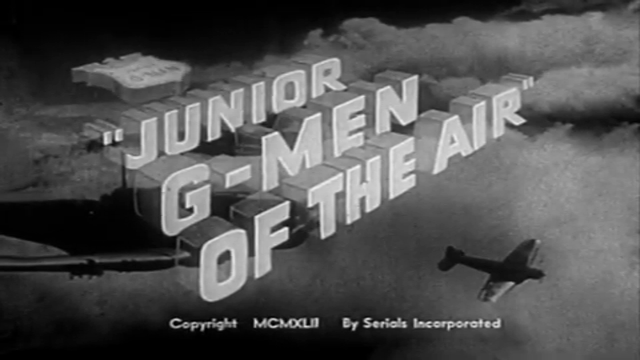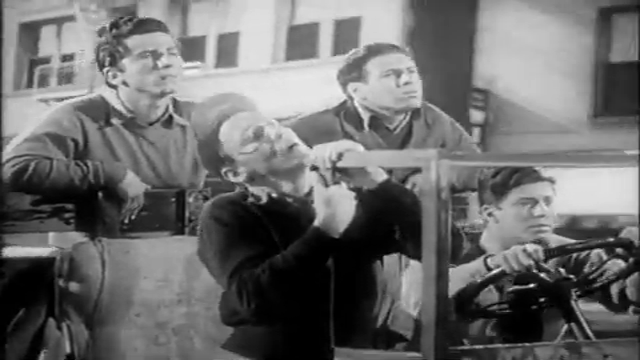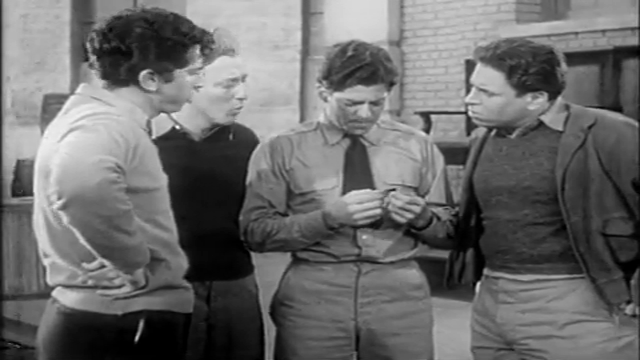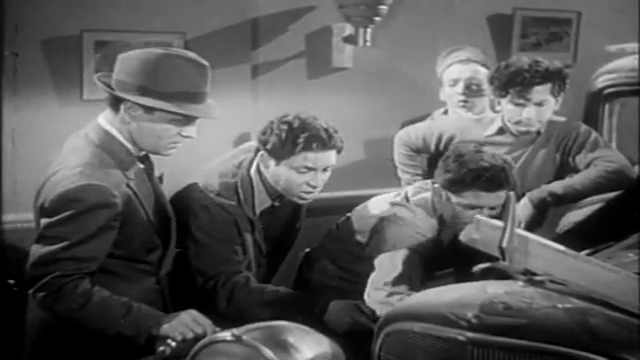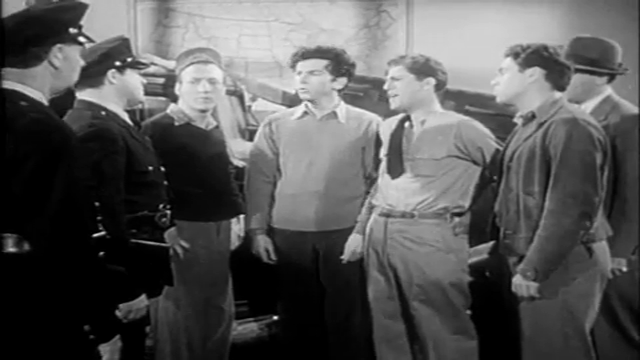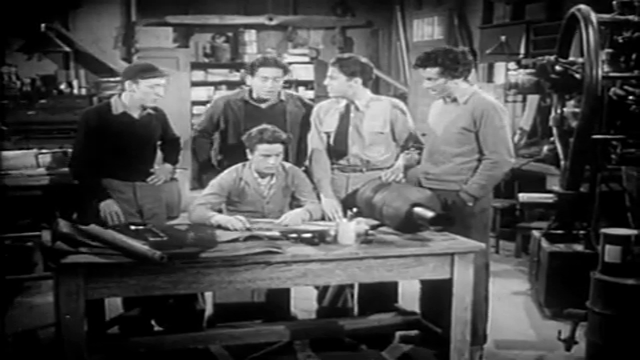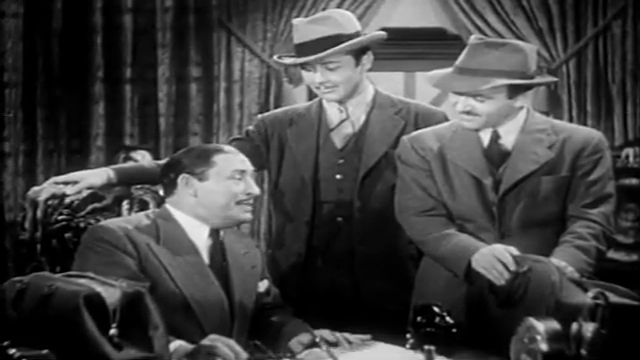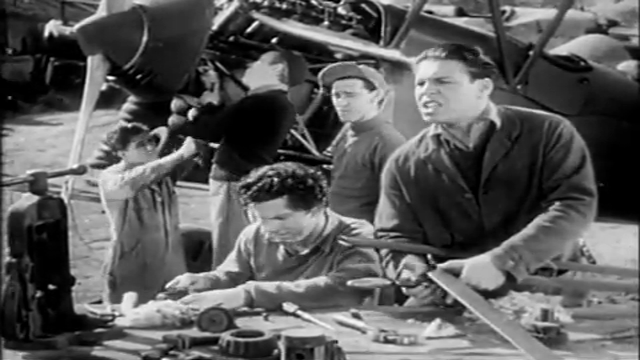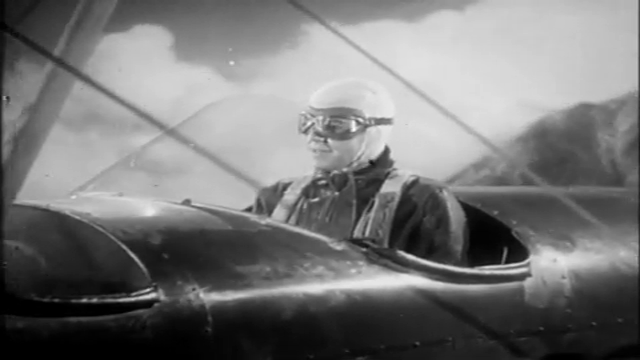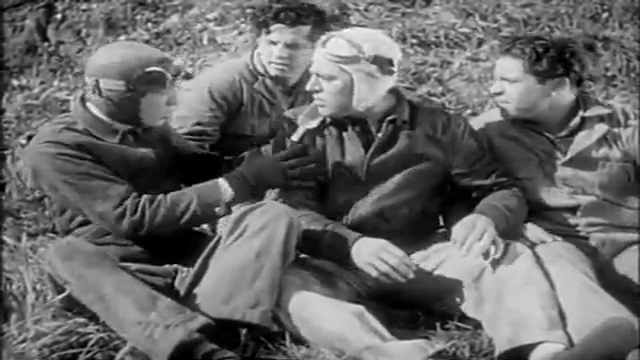-
#416 – Junior G-Men of the Air (1942)
Junior G-Men of the Air (1942)
Film review #416
Directors: Lewis D. Collins, Ray Taylor
SYNOPSIS: “Ace” Holden and his friends hang out at his Father’s airstrip, hoping to enter the local air race while Ace’s younger brother Eddie is inventing a new plane engine. Ace and his friends witness a bank robbery, and when they refuse to cooperate with the local G-man, they try and find the robbers, not realising that they belong to the “Order of the Black Dragonfly” a foreign organisation that is attempting to sabotage American industry and pave the way for an invasion. Ace and his friends join up with the junior G-men in order to combat this threat to themselves and their country…
THOUGHTS/ANALYSIS: Junior G-men of the Air is a 1942 film serial composed of twelve chapters, and the third to feature the young group of actors The Dead End Kids and The Little Tough Guys, although none of the serials are connected or have the same characters. This time, the kids are help to salvage junk at the airfield owned by the Father of one of the boys, Ace. While out collecting junk in their truck, they witness a robbery on a bank by a gang who steal their truck to make their getaway. Ace manages to get a strange broach of one of the men, but when the local G-man, Don Ames asks for the kids cooperation, they refuse due to their distrust of law enforcement. It turns out the robbers belong to a group known as the “Order of the Black Dragonfly,” a fifth column gang of saboteurs looking to destabilise American society to pave the way for a foreign invasion. As the serial progresses and Ace’s younger brother Eddie is kidnapped, the kids join up with the junior G-men, led by Jerry Markham, to find the gang and put a stop to them. The film’s plot is quite similar to Junior G-men, the first serial featuring the group of young actors, but while that one had a setting on land, and Sea Raiders focused on the sea, this one is centred around the air and aeroplanes, although there’s not too much action in the air. At least each of them have something unique about them. Other than that there’s not too much special about the story, but as with its predecessors, having the leads be these young, unruly boys rather than the typical all-american hero offers something a little different to the vast majority of serials.
The characters of the young actors are quite similar to the ones they played in the previous serials, but I suppose they are hired to play those specific roles. The leader of the gang, Ace, is the usual agitator and instigator, although he appears a bit more tidy than the previous serials for reasons I’ll get into below. At least his name isn’t Billy this time as well. Huntz Hall as “Bolts” plays his usual idiots sidekick routine without any real surprises, and “Stick” and “Greaseball” play mostly supporting roles, but they do have more lines and action than in the previous serials. While the kids are still troublemakers and somewhat hostile to any person of the law, they are less abrasive and unlikable than they were in previous serials, which again I’ll get into below. Other characters including “Double Face” Gordon add some variety to the line-up, while Don Ames as the G-man provide the more typical straight-laced law enforcement hero. Once again there’s no real female characters aside from a minor secretarial role, as it’s clear the serial is aimed at young boys of a more rebellious nature. The villains are classed as saboteurs, destroying America from within, and are obviously meant to be representing Japan. As is usual for these serials, The Japanese characters are all played by white Americans in make-up to “look” Japanese, which is not a good look to say the least, and a practice which sadly persevered for years in the film industry. Other than that, there’s nothing too remarkable about them.
Let’s get into the main aim of this serial: it is a giant propaganda piece for young Americans to serve their country in any way possible. By the time of the serials release, the U.S. had officially entered the Second World war after the attack on Pearl Harbour, and Anti-Japanese sentiment as overwhelming. A lot of these serial have secret Japanese societies of saboteurs fuelling this sentiment, as well as convincing the public to suspicious of everything around them. That the rough antics of the lead kids and their hostility to law enforcement is toned down in this serial compared to the previous ones is probably due to delivering this message that everyone must help their country in any way they can, in fact there’s multiple scenes that explicitly deliver this line. The final chapter of the serial is one big battle where the army storms the farm where the villains have set up a base, making it look like a battlefield and displaying the glorious victory of American troops. At the end everyone remarks about how vigilant they must be against enemies from within who threaten to destroy the American way of life, when they get new that Pearl Harbour has been attacked and they must now get ready for war and remain more vigilant than before. A lot of wartime serials push this messaging, but this serial is definitely more blatant about it than others I’ve seen. Maybe because it’s aimed at the younger rebellious generation that might be more reluctant to get behind their country. nevertheless, this makes for a much more interesting finale than you get in most serials, with the large scale battle making for an interesting payoff, even if it feels like mostly stock-footage not involving most of the main cast.
Overall, Junior G-men of the Air is a decent enough serial with plenty of action to keep younger viewers entertained. The overwhelming sense of wartime propaganda that fills some of the scenes is a bit much (although there’s definitely worse), and the frankly racist depiction of Japanese people as sneaky and devious is badly outdated, which was sadly not uncommon in film for a significant period of time. It doesn’t offer much that the previous two serials featuring the young actors doesn’t, but like the other two, at least does something a little different to most serials.
